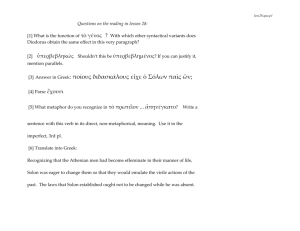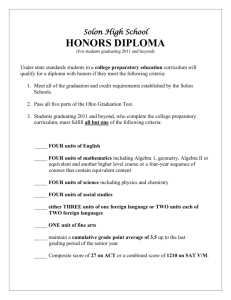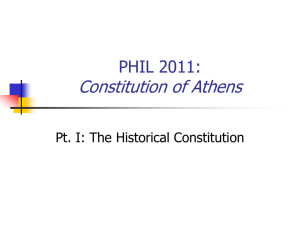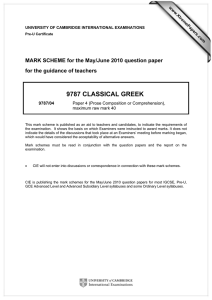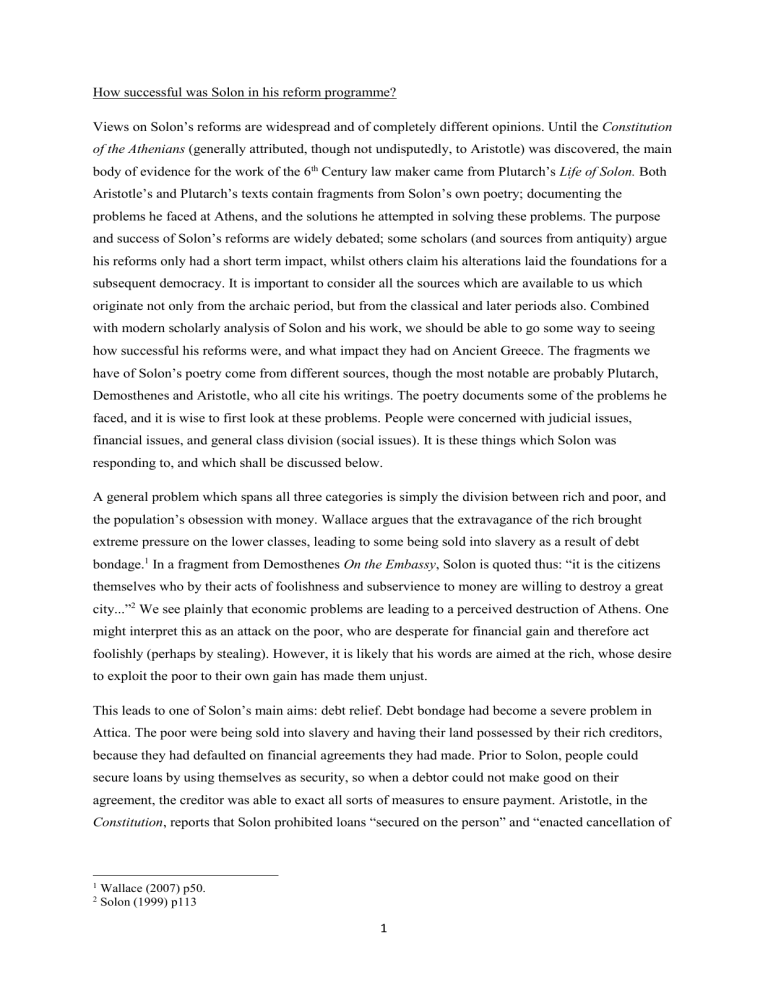
How successful was Solon in his reform programme? Views on Solon’s reforms are widespread and of completely different opinions. Until the Constitution of the Athenians (generally attributed, though not undisputedly, to Aristotle) was discovered, the main body of evidence for the work of the 6th Century law maker came from Plutarch’s Life of Solon. Both Aristotle’s and Plutarch’s texts contain fragments from Solon’s own poetry; documenting the problems he faced at Athens, and the solutions he attempted in solving these problems. The purpose and success of Solon’s reforms are widely debated; some scholars (and sources from antiquity) argue his reforms only had a short term impact, whilst others claim his alterations laid the foundations for a subsequent democracy. It is important to consider all the sources which are available to us which originate not only from the archaic period, but from the classical and later periods also. Combined with modern scholarly analysis of Solon and his work, we should be able to go some way to seeing how successful his reforms were, and what impact they had on Ancient Greece. The fragments we have of Solon’s poetry come from different sources, though the most notable are probably Plutarch, Demosthenes and Aristotle, who all cite his writings. The poetry documents some of the problems he faced, and it is wise to first look at these problems. People were concerned with judicial issues, financial issues, and general class division (social issues). It is these things which Solon was responding to, and which shall be discussed below. A general problem which spans all three categories is simply the division between rich and poor, and the population’s obsession with money. Wallace argues that the extravagance of the rich brought extreme pressure on the lower classes, leading to some being sold into slavery as a result of debt bondage.1 In a fragment from Demosthenes On the Embassy, Solon is quoted thus: “it is the citizens themselves who by their acts of foolishness and subservience to money are willing to destroy a great city...”2 We see plainly that economic problems are leading to a perceived destruction of Athens. One might interpret this as an attack on the poor, who are desperate for financial gain and therefore act foolishly (perhaps by stealing). However, it is likely that his words are aimed at the rich, whose desire to exploit the poor to their own gain has made them unjust. This leads to one of Solon’s main aims: debt relief. Debt bondage had become a severe problem in Attica. The poor were being sold into slavery and having their land possessed by their rich creditors, because they had defaulted on financial agreements they had made. Prior to Solon, people could secure loans by using themselves as security, so when a debtor could not make good on their agreement, the creditor was able to exact all sorts of measures to ensure payment. Aristotle, in the Constitution, reports that Solon prohibited loans “secured on the person” and “enacted cancellation of 1 2 Wallace (2007) p50. Solon (1999) p113 1 debts both private and public.”3 Such abolition is known as the “shaking off of burdens”, or seisachtheia. In addition to this, land which had previously been overtaken by creditors was released back to the poorer farmers, and Athenians enslaved abroad were brought back to the city. Solon is quoted by Aristotle as being sure of his success in the aforementioned accomplishments; “These things I did by the exercise of my power...and I persevered to the end as promised.”4 Yet some scholars, such as E. Harris, argue that Solon only abolished enslavement for debt, not debt bondage. Whilst Harris agrees that there is evidence that enslavement by private individuals was illegal, the notion of debt bondage remained. He cites numerous sources such as Aristophanes’ Clouds, in which Strepsiades is concerned that if he is unable to repay borrowed money, his creditor will seize him physically and take him away. 5 This leads Harris to the conclusion that at least during the 5th and 4th centuries BC, debt-bondage remained. If we are to accept this argument, the certainty with which Aristotle (and many other modern scholars) assert that Solon abolished debt bondage is ill-founded. It would appear that the success of Solon in this instance is limited to the abolition of outright slavery. However, abolishing enslavement for debt would have surely eased some of the pressure on the lower classes, and reduced hostility on their part. The threat of enslavement for debt would have created tension between the classes, and by removing this threat the tension between the two would have been diminished somewhat. Further to his reforms concerning debt and slavery, he also enforced constitutional reforms, which Wallace argued “transformed the structure of political authority from an informal oligarchy...to a legally fixed government based on law.”6 Prior to Solon, public authorities were determined by heredity and social class, meaning that the poorer you were, the less likely it was that you would be involved in government. The family you came from meant almost everything in determining your status, though it should be noted that the most important thing for anyone living in Athens was Athenian citizenship; metics had fewer political rights than even the lowest of Athenian citizens. The Solonian system, however, saw government based on law, economic status and a political role for every Athenian citizen.7 Part of his constitutional programme was the division of the Athenian population into four property classes, determined by their agricultural production. An initial reaction might be to suggest that this was simply a different way of classifying citizen rights, with the top class replacing the traditional aristocracy and still leaving the poor disadvantaged. But Wallace puts forward an explanation of the purpose of these classes suggested by Martin Oswald; that “belonging to a class did not describe a “right”...but the expectation the community had of a member.”8 If Ostwald is correct, Solon’s classes are not necessarily a reflection of the old oligarchical 3 Aristotle, Constitution of the Athenians, 6.1 Const. Ath. 12.4 5 Harris (2002) p423 6 Wallace (2007) p60. 7 Ibid. 8 Ostwald in Wallace (2007) p61 4 2 discrimination, but a way of determining what could be expected of each citizen. Even the thetes (lowest class) had responsibility, and were allowed to attend and vote in the assembly. As we have seen, Solon was responding to a social problem centred on the gulf between rich and poor. His property classes by no means made all citizens equal. However, it did allow every citizen the opportunity to be involved in the community, and Wallace suggests that citizens were actually expected to involve themselves in civic duties.9 Such a sense of inclusion must have undoubtedly helped ease the tension between the opposing classes. It would have been unrealistic to expect Solon to transform the community to such an extent that everyone had equal opportunities in holding office; he would have been met with insurmountable hostility. But this introduction of the four classes meant access to the courts and participation in civil service was easier, which would have probably have led to reduced conflict within the community. Solon’s property classes were not the only measure which allowed the basis for power to be spread more evenly. Archonship and other positions in office were made available to the top three classes, with the lowest class being able to serve in jury, and to vote, as we have already seen. But for powerful positions such as Archonship, Solon would have wanted to presumably take care to ensure the selection for these positions was fair. The process of election by lot is commonly attributed to Solon, which if true could have had a number of consequences or aims. Primarily, the diversity of Archons would have been broadened. This would have benefitted almost all of the community; the aristocracy would get their fair chance of power, and the lower classes would have more control over who held these positions of power. The process of election by lot would have been backed up by the “scrutiny of officials” which Wallace argues Aristotle is particularly certain of.10 Since Archons were elected by the demos, it made sense to allocate them the task of examining them following their time in office. The demos equally had power to “overturn judicial verdicts by Archons.”11 If both of these two measures really were Solonian, they would have ensured the demos became a crucial element of society. Accountability to the demos, Wallace proposes, was a key part of the ideology of democracy in the fifth century, a century after the time of Solon.12 Herodotus writes: “But the rule of the multitude has...the loveliest name of all, equality...”13If one does attribute these constitutional reforms to Solon, it would be easy to see why people hail him as the founder of Athenian democracy. Although Solon did not give all citizens the equal opportunity to hold every position in office, he did allow them involvement in electing who could hold these positions, which is surely reflective of the usual perception of democracy. 9 Wallace (2007) p61 Ibid p62 11 Ibid pp62-62 12 Ibid p63 13 Herodotus Histories 3.80.6 10 3 Access to the courts was also improved during Solon’s time. Previously, only a victim could initiate court proceedings against the accused, leaving the likelihood of being taken to court minimal (and presumably not a great deterrent). But Solon is credited with a reform that “14allowed any citizen (ho boulomenos) to seek redress on behalf of another who had been wronged.” Raaflaub argues that this measure was one which sought to enhance “equality before the law” which would have increased awareness amongst citizens of political issues, and created a sense of responsibility.15 Further to this, the heliaia was established. This was essentially a court of appeal; if citizens were displeased with a decision made in other courts for example, they could appeal to the heliaia. These measures were compounded by the creation of a Council of 400, amongst others. By making courts accessible, Solon would appeal to those who called for greater equality amongst citizens, not excluding anyone from political proceedings and opportunities. On the surface, it might be plausible to credit Solon as founder of democracy; his reforms certainly gave people more power than they had during the 7th century. The poor were no longer in fear of slavery resulting from failure to repay debts, and had greater opportunity for involvement in decisions relating to the state. The acceptance of the demos was almost vital to ensure the security of and Archon’s position. However, there are suggestions that Solon only really gave the demos the powers he felt were absolutely necessary.16 Although Solon ensured the elite Archons were “checked in their tendency to abuse power and seek unjust gain”17 , it is likely that he will have still wanted them to remain in a position f power. If he had given the lower classes too much influence, there would have been great discontent amongst the wealthy, who would have probably felt cheated. Solon himself realised that a balance of power between the two was necessary: “I have given the masses as much privilege as is sufficient....and for those who had power and were envied for their wealth...they too should suffer no indignity.”18 There can be no dispute that the demos had less power than the aristocracy. But the reforms he carried out were probably sufficient in ensuring the rich were unable to rule as tyrants, and that the poor were involved in political decisions and judicial proceedings. In short, there must have been far less animosity amongst the citizens than before. The reforms previously discussed are a sample of the many pieces of legislation Solon is credited with throughout his time as Archon. He was clearly responding to problems deriving from division in society, as we have seen, therefore the measures he took must be analysed accordingly in terms of their success of failure. His abolition of enslavement for debt, and the seisachtheia, would have created a better atmosphere and platform for Solon to set to work on further reforms. If he wanted to ensure that society cooperated with his reforms collectively, he would first have had to create a 14 Raaflaub (2007) p143 Ibid 16 Ibid p142 17 Ibid 18 Solon in Aristotle, Constitution of the Athenians (1999) p121 15 4 situation in which hostility between classes was at a minimum. There can be no doubt that the abolition of enslavement for debt, the cancellation of existing debts, and the returning of land back to its rightful owners would have contributed to this. The majority of society would have directly benefitted from such measures, and would presumably have confidence in Solon and his subsequent reforms. The power he proceeded to give the demos in electing officials, and surveying their time in office would have instilled a sense of inclusion amongst the citizens of Athens. Having discussed whether Solonian reforms were effective in quashing conflict between the classes in the short term, we must surely discuss whether Solon had a real lasting impact on the way Athens operated. Aristotle, in the Constitution of the Athenians, suggests that Athens had eleven stages of constitution, with the Solonian era at stage three: “Third was the one that followed the civil disturbance in the time of Solon, from which democracy took its beginning.19 If Solon is credited as laying the foundations for democracy, his reforms must have had a lasting impact, even if they had been altered or adjusted. Aristotle and Plutarch both document that Solon, after implementing his reforms, left the country for ten years, and travelled to Egypt.20 During this time, Aristotle claims, the Athenians had sworn to obey the laws Solon laid down for 100 years. But under Aristotle’s writings, “though the city was still disturbed, for four years they kept at peace; but in the fifth year...they did not appoint an Archon...”21 This failure to appoint an Archon was probably due to conflict amongst different political and social groups within the society, who could not agree on a leader. It seems that on this count, Solon’s wish for the demos to elect their leaders had failed, at least until the appointment of Damasias in 582. His rule lasted for twenty-six months according to Aristotle, clearly opposing the law stating that one cannot old office for more than a year. Clearly the elite were not happy to give up their powers of control once they had secured them, a problem which Solon wanted to keep in check. Wallace suggests that the failure to appoint an Archon was not the only issue on which Solon appears to have fallen. There is no recorded activity, he argues, of the Aeriopagos Council until after 480, perhaps because of social conflict.22 But there can be no escaping the question of why the people did not utilise their powers in the Assembly, for example, or their powers to elect who they wished as Archons. Wallace asks why they did not develop Solon’s constitution into a fully fledged democracy, and offers some suggestions in an attempt to answer these questions.23 As we have seen, Solon had not destroyed the old order in which the rich had the monopoly on political power, since they were the origins of the Archons. This is perhaps one of the most important things one must do in order to establish a completely new system. Whilst traces of the old remain, the new cannot flourish. Further to this is a suggestion 19 Aristotle, Const. Ath. 41.2 Ibid 11.1 21 Ibid 13.1 22 Wallace (2007) p73 23 Ibid p74 20 5 centred on the nature of society in Athens; the population was broadly made up of farmers, who before Solon had been furious that the wealthy had overtaken their land. As soon as their land had been restored to them, they will have wanted to return to their land, and not spend time partaking in political practices which did not concern them. In addition, factions had broken out, resulting in three regional groups, all with different interests and desires. Some favoured an oligarchic regime whilst others accepted Solon’s moderate constitution. Eventually, in 561, the Athenian people were fed up, and elected to establish a tyranny; the path which Solon was so keen to avoid. This came in the form of Peisistratus, and later his sons Hippias and Hipparchus; they ruled harshly and quite differently to Solon. But the people were initially won over because of Peisistratus claim to fully support the poor. He was unafraid of confronting the aristocracy, but both the rich and poor supported him, as can be seen in the Constitution of the Athenians.24Perhaps a criticism of Solon was that he was never forceful enough in any of his reforms. Plutarch notes that “chief men persistently recommended a tyranny to Solon, and tried to persuade him to seize the city...”25 and that those who supported neither the rich nor the poor were not unwilling to have a single ruler, in manner of a tyranny. This was, Plutarch suggests, because “it would be a laborious and difficult matter to effect a change by means of argument and law...”26 Perhaps if Solon had established himself as a tyrant, and subsequently remained in Attica, his reforms would not so quickly have been overcome by Peisistratus. What we are to make of Solon’s reforms remains open to question. In the short term, as Dillon and Garland argue, “the conflict between the rich and the poor was certainly diffused to a great extent.”27 His reforms did answer the needs of the poor, who wanted land restored, and to have more opportunity for political involvement where it concerned them. In this sense, Solon was successful. He did not give in to the radicals who wanted redistribution of land by force and violence, but equally did not allow the rich to take control completely. It is for these reasons that people credit Solon with laying the foundations for democracy. But longer term, and in fact within a few years after Solon’s departure, the moderate constitution which he had established began to crumble. Various explanations for this are available, and all should be seriously considered. Soon, Attica was under tyranny once more, a path which Solon was so sure to divert from. Despite this, Solon was subsequently held up as one of the Seven Sages of Greece, for his work as a moderate leader. His legacy lived on, not just in Ancient Greece but in modern interpretation too. Although Solon did not put an end to the problems facing Attica once and for all, he brought at least temporary relief from the tensions which had previously overcome it. Surely in some sense, even if he was merely a stop-gap between different stages of Athenian constitution, Solon must be credited with some success as a moderate lawgiver and lawmaker, even if his reforms remained only temporarily. 24 Aristotle, Const. Ath. 16.1-9 Plutarch, Solon 14.3 26 Ibid 27 Dillon an Garland (2010) p318 25 6 Bibliography Aristotle. (n.d.). Constitution of the Athenians. Retrieved November 2011, from Perseus Digital Library: http://www.perseus.tufts.edu/hopper/text?doc=Perseus%3Atext%3A1999.01.0046%3Achapter%3D1 Dillon, M., & Garland, L. (2010). Ancient Greece: Social and Historical Documents from Archaic Times to the Death of Alexander The Great (3rd Edition ed.). London: Routledge. Gerber, D. (1999). Greek Elgaic Poetry; from the Seventh to the Fifth Centuries BC. Cambridge (Mass): Harvard University Press. Harris, E. (2002). Did Solon Abolish Debt Bondage? The Classical Quarterly , 52 (2), 415-430. Herodotus. (n.d.). The Histories. Retrieved November 2011, from Perseus Digital Library: http://www.perseus.tufts.edu/hopper/text?doc=Perseus:text:1999.01.0126 Plutarch. (n.d.). Solon. Retrieved November 2011, from Perseus Digital Library: http://www.perseus.tufts.edu/hopper/text?doc=Perseus%3Atext%3A2008.01.0063%3Achapter%3D1 Raaflaub, K., Ober, J., & Wallace, R. (2007). Origins of Democracy in Ancient Greece. California: University of California Press. Rhodes, P. (2007). The Greek City States: A Source Book. New York: Cambridge University Press. 7
